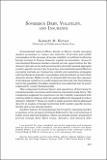| dc.contributor.author | Kletzer, Kenneth M. | |
| dc.date.accessioned | 2019-11-01T00:03:14Z | |
| dc.date.available | 2019-11-01T00:03:14Z | |
| dc.date.issued | 2006 | |
| dc.identifier.isbn | 956-7421-23-4 | |
| dc.identifier.uri | https://hdl.handle.net/20.500.12580/3714 | |
| dc.description | International capital inflows should, in theory, enable emerging market economies to reduce the volatility of private and public consumption in the presence of income volatility, in addition to allowing foreign savings to finance domestic capital accumulation. Access to international financial markets should provide opportunities for the domestic private sector and government to diversify against aggregate country-specific income risk. In practice, international capital flows to emerging markets are themselves volatile and sometimes propagate external shocks to domestic consumption and investment or exacerbate domestic shocks. Higher levels of external debt increase the exposure of developing countries to world output and interest rate fluctuations and to the possibility of sudden capital flow reversals that may be poorly explained by country fundamentals. | |
| dc.format | .pdf | |
| dc.format.extent | Sección o Parte de un Documento | |
| dc.format.medium | p. 327-352 | |
| dc.language.iso | eng | |
| dc.publisher | Banco Central de Chile | |
| dc.relation.ispartof | Series on Central Banking, Analysis, and Economic Policies, no. 10 | |
| dc.rights | Attribution-NonCommercial-NoDerivs 3.0 Chile | * |
| dc.rights.uri | http://creativecommons.org/licenses/by-nc-nd/3.0/cl/ | * |
| dc.subject | DEUDA | es_ES |
| dc.subject | SEGUROS | es_ES |
| dc.title | Sovereign debt, volatility, and insurance | |
| dc.type.doc | Artículo | |
| dc.file.name | BCCh-sbc-v10-p327_352 | |


